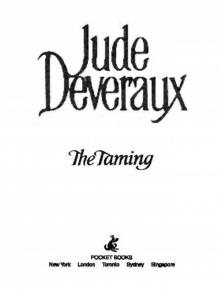- Home
- Jude Deveraux
The Summerhouse Page 2
The Summerhouse Read online
Page 2
When she was three months pregnant with Joe, Leslie made the trek out to the summerhouse. In the months since Alan had first set up a TV in the place, Leslie had almost forgotten that her retreat still existed. But from the first day, Joe was an easier pregnancy than Rebecca, and Leslie’s mother had started taking her granddaughter on short jaunts about town. “There’s nothing more uninteresting than a nursing baby,” her mother had said in her usual forthright style. “When she starts walking and looking at something besides her mother’s bosom, then I’ll take an interest in her.”
So, on her first afternoon of freedom, for that’s the way it felt, Leslie had made her way out to the summerhouse. Maybe this time, she’d be able to stretch out on the wicker chaise lounge she’d found in an antique shop and read a book.
But when Leslie pushed open the door, her breath stopped. Vaguely, she’d wondered why Alan had used the summerhouse only a few times, then never said anything about it again.
Someone had left the doors open and it had rained in on her furniture. Before she was first pregnant, she’d made the slipcovers for the little couch and the two chairs. She’d made the matching curtains and hung them herself. But now mice were nesting in the stuffing of the couch, and it looked as if a neighboring cat had clawed the arms of the chairs.
Turning away, she felt tears come to her eyes. She didn’t even bother to close the door as she ran back to the house.
Later, she’d tried to have a confrontation with Alan, but he’d expressed such concern that her anger was going to harm the baby, that Leslie had calmed down. “We’ll fix it up after you’ve had the baby,” he said. “I promise. Scout’s honor.” He’d kissed her then and helped her with Rebecca and later, he’d made sweet love to her. But he didn’t fix the summerhouse.
After that, Leslie had been so busy with children and helping Alan establish himself within the community that she wouldn’t have had time to get away even if she’d had a place to go. And as the years followed each other, the summerhouse became a storage shed.
“So how’s my old girl this morning?” Alan asked from behind her. He was two months younger than Leslie and he’d always found jokes about their age difference to be amusing. Needless to say, Leslie didn’t see the humor.
“I made pancakes,” she said, keeping her face turned away to hide her frown. She hadn’t yet come to terms with the idea of turning forty. Hadn’t it been only last week when she’d boarded a bus and headed to big, bad New York City, where she was going to turn the town on its ear with her dancing?
“Mmm,” Alan said. “Wish I had time, but I have a full schedule today.”
When she turned around, he was looking down at the newspaper, absorbed with the financial section. In the seventeen years that they’d been married, Alan hadn’t changed much. Not physically anyway. His hair was now gray, but on him it looked good. He said that an insurance agent was considered more trustworthy if he looked older. And he kept in shape by going to the gym regularly.
What had changed about him was that he no longer seemed to actually see any of them, not his wife, not his two children. Oh, Rebecca could throw one of her look-atme fits and she could get his attention, but Joe and Leslie, with their easygoing ways, were mostly ignored by him.
“You ought to leave him,” Leslie’s mother said, even more outspoken now than she had been when her husband was alive. Widowhood agreed with her. “If you left him, he’d find out how much he needs you. You need to shake up his perfect little world. Show him what matters.”
But Leslie had seen what happened to women her age who left their handsome, successful husbands, and Leslie had no desire to live in some dreary little apartment and work at the local discount store. “Mother,” Leslie often said in exasperation, “I have no skills to make my own way in the world. What would I do? Go back to dancing?” That she had failed at her one and only attempt at success in the world still haunted her.
“Where did I go wrong with you?” her mother would moan. “If you left him, he’d fall apart. You’re the man’s entire life. You do everything for him. If you left, he’d—”
“Run off with Bambi,” Leslie said quickly.
“You were a fool to let him hire that little tart,” her mother had snapped.
Leslie looked away. She didn’t want her mother to know how she’d fought her husband’s hiring the beautiful, young girl. “You hired a girl named Bambi?” Leslie had said, laughing in disbelief, at the dinner table the first night he’d told her. “Is she over twelve?”
To Leslie, it had been a joke, but when she looked at Alan’s face, she could see that he didn’t think his new secretary was a joke. “She is very competent at her job,” he’d snapped, his eyes drilling into his wife’s.
As always, Joe had been sensitive to any disagreement and he’d pushed his plate away. “I got some homework to do,” he’d mumbled, then left the table.
Rebecca never seemed to see anything outside her own realm. “Did I tell you what that dreadful Margaret said to me today? We were in chemistry class, and—”
Leslie had at last looked away from her husband’s eyes, and she’d never again made a snide remark about Bambi. But Leslie had been curious, so she’d called a woman she’d gone to high school with who worked in Alan’s office and invited her to lunch. After lunch, Leslie had gone home and made herself a strong gin and tonic and taken it to the bathtub with her. She’d been told that Alan had hired Bambi six months earlier and that she was more than just his secretary, she was his “personal assistant.” Paula, who’d been on the cheerleading squad with Leslie in high school, warmed to her story and seemed to enjoy “warning” Leslie. “If he were my husband, I’d put an end to it, I can tell you that,” Paula had said with emphasis. “That girl goes everywhere with Alan. All I can say is that it’s a good thing we don’t have one of those unisex bathrooms or she’d—”
“Would you like to have some dessert?” Leslie had said rather loudly.
Now Bambi had worked for, with, “under,” if the gossip were to be believed, Alan for over a year. And, quite frankly, Leslie didn’t know what to do about it. Every friend she had had an opinion and freely gave it to Leslie.
One day Rebecca had overheard some women giving Leslie advice about this young woman who worked so closely with Alan, and later, Rebecca had said, “Mother, you ought to tell them to go to hell.”
“Rebecca!” Leslie had said sternly, “I don’t like that kind of language.”
“It’s possible that your husband is having an affair with his over endowed secretary and you’re worried about bad language?”
Leslie could only stand there and blink at her daughter. Who was the adult? How did her daughter know—?
“It’s all over the church and at the club,” Rebecca said, sounding as though she were thirty-five instead of just fifteen. “Look, Mom, men stray. They get itchy pants. It’s normal. What you ought to do is tie a knot in his—”
Leslie gasped.
“All right, go ahead and live in the nineteenth century. But that Bambi is a bitch and she’s after Dad and I think you should fight!”
At that Rebecca had left the room, and all Leslie could do was stare after her. Leslie hadn’t the least idea of how to deal with a child who had just said what her daughter had, so Leslie pretended that it hadn’t been said.
In fact, that’s what Leslie seemed to be doing a lot of lately: pretending that nothing was wrong, that nothing bad had happened. She couldn’t go so far as to, say, call Alan’s office and tell his assistant to remind him of so and so party. No, instead, Leslie just worked around the whole idea of Bambi by pretending that the young woman didn’t exist. And when the women at church or the club tried to warn her, Leslie perfected a little smile that let them know that she was above such low suspicions.
But now, looking at Alan as he bent over the newspaper, she wondered if he wasn’t eating her pancakes for fear that he’d put on weight and Bambi wouldn’t like that.
“So, M
om!” Rebecca said as she came into the room, “what are you old ladies going to get up to this weekend? Think you’ll have an orgy with lots of bronzed young men?”
Part of Leslie wanted to reprimand her smart-mouthed daughter, but another part, the woman part that was separate from being someone’s mother, wanted to joke with her daughter. “Ellie is bringing Mel Gibson and Harrison Ford,” Leslie said as she glanced at her husband.
But Alan didn’t seem to hear. Instead, he looked at his watch. Even though it was only seven A.M., he said, “Gotta go.”
“Are you sure you wouldn’t like a pancake or two?” Leslie asked, knowing that she sounded whiny. What she wanted to say was, “You can damned well spend an hour with your family before rushing off to your bimbo.”
But Leslie didn’t say that. Instead, she tried to smile invitingly.
“Sounds good, but I’m meeting some clients this afternoon and we have lots of paperwork to go over before the big meeting.”
Even though the name was hardly ever said, all of them knew that “we” was Alan and Bambi.
Alan walked over to Leslie and gave her a kiss on the cheek. “I hope you have a good time,” he said. “And, about your birthday . . .” He gave her a little-boy look that years ago she’d found irresistible.
“I know,” she said with a forced smile. “You’ll get me something later. It’s all right. My birthday isn’t for three days anyway.”
“Thanks, hon,” he said, kissing her cheek again. “You’re a brick.” Grabbing his jacket off the back of a chair, he left the house.
“‘You’re a brick,’” Rebecca mimicked as she ate a spoonful of some cereal that looked like extruded sawdust. “You’re a chump.”
“I won’t have you talk about your father like that,” Leslie said, glaring down at her daughter. “Or me.”
“Nice!” Rebecca said, coming out of her chair. She was as tall as her mother, so they were eye to eye across the breakfast table. “All you care about is nice! Nice words, nice manners, nice thoughts. But the world isn’t nice, and what Dad is doing with that leech isn’t nice.”
Suddenly, there were tears in Rebecca’s eyes. “Don’t you know what’s going to happen? That woman is going to break us up. She wants what we have, not the family, but the money. She wants the silver tea set and the . . . and the fifty-thousand-dollar kitchen that you hate but were too cowardly to tell Dad that you didn’t want. We’re going to lose everything because you’re so damned nice.” With that, Rebecca ran out of the kitchen and up the stairs.
And in the next moment, a car horn blew outside and Leslie knew that the shuttle bus that would take her to the airport was there. For a moment, she hesitated. She should go to her daughter. Her daughter was upset and needed her, and a mother always gave, didn’t she? A good mother was always there for her children, wasn’t she? A good mother—And a good wife, Leslie thought. That’s what she was: a mother and a wife.
Suddenly, Leslie didn’t want to be anyone’s wife or anyone’s mother. She wanted to get on a plane and go see two women she hadn’t seen since she was very young, since before she was anyone’s wife or mother.
Leslie practically ran out of the kitchen, grabbed her handbag off the hall table and her two suitcases from the floor, then opened the front door. She yelled, “Good-bye. See you on Tuesday,” up the stairs to her two children, but she didn’t wait for an answer. A minute later and she was in the van, the driver was pulling away, and it was then that Leslie realized that she hadn’t brushed her teeth. She doubted if she’d missed an after-meal brushing of her teeth since she was three years old, and she almost told the driver to stop and go back.
But then Leslie leaned back against the seat and smiled. Not brushing her teeth seemed to be a sign that she was about to start on an adventure. In front of her were three whole days that were hers and no one else’s. Freedom. She hadn’t been on a trip by herself since she’d gone to New York nineteen years ago. What was it going to be like to not have people asking, “Where’s my tie?” “Where’s my other shoe?” “Hon, could you call down and order me something to eat?” “Mom! What do you mean that you didn’t bring my red shorts? How can I have any fun without those shorts.”
For a moment Leslie closed her eyes and thought of three days of freedom; then a laugh escaped her. Startled, she opened her eyes to see the driver looking at her in the mirror, and he was smiling.
“Glad to get away?” he asked. They were the only people in the van.
“You can’t imagine,” Leslie said with feeling.
“Whoever takes care of you better not leave you alone too long,” the man said, still looking at her, his eyes flirting.
Leslie knew that she should give him her best “Mrs. Church-Lady look,” as Rebecca called it, after the comedian on TV. But right now Leslie didn’t feel like giving that look. The driver was a good-looking young man and he’d just paid her a compliment. She smiled at him, then leaned her head back against the seat and closed her eyes, feeling the best she’d felt in a long, long time.
Two
Ellie Abbott leaned back against the seat of the airplane, closed her eyes, and thought, What the hell have I done?
Leaning forward again, she picked up the plastic cup of club soda from the fold-down tray, but when she tried to bring it to her lips, she saw that her hand was shaking. Putting the cup down, she tried to calm her nerves by looking out the window.
She was on a propeller plane flying into Bangor, and she was glad that the plane wasn’t divided into classes because no longer did she travel in first class. In Ellie’s mind she didn’t deserve such perks as first class because she was no longer Alexandria Farrell, the writer who had caused such a storm when her books first came out, five of them, one after another. Boom. Boom. Boom.
No, it had been three years now since Ellie had written a word. It had been three years since the stories inside her head had stopped. Three years since her divorce and what had been done to her by the courts, by the American “justice” system.
Again Ellie tried to drink from her cup, but her hand was trembling too much to keep from spilling the drink. Nervously, she glanced at the man sitting across the aisle from her, but he hadn’t seemed to notice anything. And, thankfully, he hadn’t given any sign that he knew “who” she was.
Or used to be, Ellie thought. Like those old movie stars who were stopped on the street and asked, “Didn’t you used to be so and so?”
Well, Ellie was still Ellie, Abbott again, back to her maiden name, no longer using her married name, but she didn’t feel that she was still Alexandria Farrell the writer.
“You can’t go through this birthday alone,” her therapist had said. Jeanne was now the only person Ellie saw on a regular basis. For three years now Ellie had retreated from the world, telling people that she needed time to “recover.” But about eight months ago, after her second attempt at obtaining justice had failed, Ellie had sought professional help.
“I don’t want to see anyone,” Ellie had said. “Everyone knows me as I once was.”
Jeanne had sighed. No matter what she said to Ellie, nothing seemed to penetrate the wall she’d put around herself. “You still are who you always were. It’s time you got over this and went forward with your life.”
“But who would even recognize me as I am now?” Ellie said heavily.
Jeanne narrowed her eyes at Ellie. “You can lose the weight. You need to go to a gym. Who knows, you might meet someone there and—”
“Not again!” Ellie had exploded. “I’ll never, never go through that again. And who would want me? I’m fat and I’m rich!”
Jeanne had blinked at Ellie a couple of times, then they both laughed at the absurdity of what Ellie had just said. Not many people looked on having money as something bad.
“You know what I mean,” Ellie said. “After what was done to me I’m afraid that people only want me for what they can get from me.”
“Yes, I know,” Jeanne said, surreptitiously gla
ncing at the clock behind Ellie’s head. In these months they had made little progress in getting Ellie past what had happened to her, and the trauma was making Ellie stand still in life, unable to move forward. Three years ago, Ellie had been on top of the world with her great success as a writer, but now she rarely left her apartment. And to make matters worse, she’d given up nearly all forms of physical activity, so she’d put on forty pounds, and forty pounds on someone just five foot one was a lot of weight.
But, try as she might, Jeanne couldn’t get Ellie to move, to go anywhere, to try to get out of what was turning into a serious depression.
“All right, there must be someone you could spend your fortieth birthday with. If you don’t want to be with your publishing friends, how about someone from your hometown?”
“Richmond? You mean I should call up an old high school buddy and ask her to share a pink birthday cake with me? Think I can get someone who’ll wear her old cheerleading skirt?”
Jeanne knew too well the trap of Ellie’s sarcasm. “There must be someone,” she said forcibly. “Someone somewhere!”
“Actually . . .” Ellie had said, looking down at her nails, which were no longer professionally manicured.
“Yes,” Jeanne said encouragingly.
“On my twenty-first birthday I met two other women at the DMV here in New York. It was their twenty-first birthday also, and we . . .”
“Yes?” When Ellie didn’t say anything more, Jeanne pushed. It was the first time Ellie had mentioned these women, and if there was any possibility that Ellie would spend time with them and get out of her apartment, then Jeanne just might write the invitations herself. “Who are these women?” Jeanne asked. “How can you get in touch with them? Can you three spend your birthday together?”
“I really don’t know where they are now. We met that one day and spent a few hours together. It was, you know, just one of those things that happens to people. We were at the DMV for hours because—” Ellie broke off and gave a bit of a smile at the memory, and it was that smile that made Jeanne pounce.

 Eternity
Eternity The Temptress
The Temptress The Taming
The Taming True Love
True Love Forever...
Forever... Lavender Morning
Lavender Morning The Velvet Promise
The Velvet Promise Days of Gold
Days of Gold Temptation
Temptation Counterfeit Lady
Counterfeit Lady Twin of Fire
Twin of Fire Remembrance
Remembrance Velvet Angel
Velvet Angel The Enchanted Land
The Enchanted Land Just Curious
Just Curious Wild Orchids
Wild Orchids First Impressions
First Impressions Wishes
Wishes Twin of Ice
Twin of Ice Ever After
Ever After An Angel for Emily
An Angel for Emily River Lady
River Lady The Invitation
The Invitation Scarlet Nights
Scarlet Nights The Black Lyon
The Black Lyon High Tide
High Tide The Girl From Summer Hill
The Girl From Summer Hill Sweetbriar
Sweetbriar As You Wish
As You Wish For All Time
For All Time Secrets
Secrets The Blessing
The Blessing Upon a Midnight Clear
Upon a Midnight Clear The Mulberry Tree
The Mulberry Tree The Scent of Jasmine
The Scent of Jasmine Sweet Liar
Sweet Liar Carolina Isle
Carolina Isle Holly
Holly A Knight in Shining Armor
A Knight in Shining Armor Always
Always The Duchess
The Duchess Forever and Always
Forever and Always The Raider
The Raider The Conquest
The Conquest Moonlight in the Morning
Moonlight in the Morning The Heiress
The Heiress Stranger in the Moonlight
Stranger in the Moonlight Moonlight Masquerade
Moonlight Masquerade Change of Heart
Change of Heart The Awakening
The Awakening Velvet Song
Velvet Song Someone to Love
Someone to Love The Summerhouse
The Summerhouse The Princess
The Princess Highland Velvet
Highland Velvet A Forgotten Murder
A Forgotten Murder Lost Lady
Lost Lady Met Her Match
Met Her Match LEGEND
LEGEND Forever: A Novel of Good and Evil, Love and Hope
Forever: A Novel of Good and Evil, Love and Hope Scarlet Nights: An Edilean Novel
Scarlet Nights: An Edilean Novel